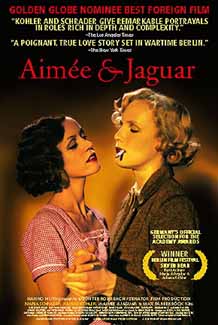
AIMEE AND JAGUAR
Germany, 1999, 125 minutes, Colour.
Maria Schrader, Juliane Kohler.
Directed by Max Farberbock.
Aimee and Jaguar was nominated for many awards in its native Germany, winning best actress awards at the Bavarian film festival as well as the two actresses tying for the Silver Bear at the Berlin film festival. It was a nominee for Golden Globe for best foreign language film.
While the film is set forty-five years after the time in which the initial action takes place, it is part of the constant reminder through films to the German people of their past, the Nazi history and its consequences. The film recreates the atmosphere of World War Two in Berlin, the hardships for the residents, the bombings. It also focuses on people working in the underground and the Gestapo tracking them down.
The film was also a story of friendship and love. Maria Schrader portrays Felice, code name Jaguar, who is an undercover agent being pursued by the Gestapo. She takes refuge with a wife and mother, Lilly, played by Juliane Kohler. Lilly is unhappy in her marriage – and the two women begin a relationship. However, with the atmosphere of the war in 1943-44 and the Battle of Berlin, it is a doomed relationship.
The film is interesting for its portrayal of the history, its portrait of the two women and their relationship.
1. Berlin towards the end of World War Two, the city itself, the bombings and the results of the bombings? The ordinary homes and streets? The atmosphere of the war? The context for a portrait of family, relationships, Jews, lesbian love, tragedy?
2. Berlin in itself, as a character in war films? The contrast between the dangers of war, the bombings and the ordinary life of Germans, at home, in the offices, official functions? The special effects for the re-creation of the bombings? The musical score?
3. The title, the real names of the women, their code names? The predatory nature of the Jaguar, Aimee and its meaning being loved?
4. The prologue, the photos, the sense of anticipation? The setting in the 1990s, Mrs Wust? The house, the institute – and Ilse and her presence?
5. The war experience, pre-war Nazism, the effect on the German people, the atmosphere of racism with Nazism? Illicit love, lesbianism and persecution? The screenplay for asking for understanding?
6. The focus on Lilly, her friendship with Ilse, the concert, the bombings, the play, the themes?
7. Lilly in herself, bold, the paper and the boss, spying, the contacts? The photos and the escape? Ilse and family? The poem and the reaction? In love, the power of love, motivations?
8. Lilly as wife, her relationships, son, the Nazi lover? Prejudice, the lifestyle? Reaction to Felice? The advances? Change, resistance? Being led on? Tormented? The transition to the present, the sense of absence? The lyrical aspects? The son and the domestic life? Parents and ideas? Discovery of the truth?
9. The lesbian group, Klara, Ilse? The bonds, the meetings, in the cafés, the pin-ups, the clubs? The hidden life? Behaviour? The shooting and the Nazis?
10. The portrait of the husband, reactions, the celebration? Anti-divorce? Death?
11. The character of Felice, her dilemmas? Her background, espionage? Staying with Lilly? Staying away? The role of Ilse? The farewells, the jealousies? The final decision to stay, the reaction of the Nazis, Hitler’s assassination?
12. The final telling of the truth, the consequences? The lyrical experience? Her being caught, the escape, in prison?
13. The passing of time with the decades, Ilse, blaming herself? Her final decisions?
14. How was the story symbolic of Germany during the war – and post-war experiences?